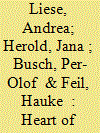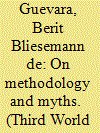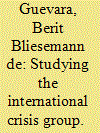|
|
|
Sort Order |
|
|
|
Items / Page
|
|
|
|
|
|
|
| Srl | Item |
| 1 |
ID:
179328


|
|
|
|
|
| Summary/Abstract |
Expert authority is regarded as the heart of international bureaucracies’ power. To measure whether international bureaucracies’ expert authority is indeed recognised and deferred to, we draw on novel data from a survey of a key audience: officials in the policy units of national ministries in 121 countries. Respondents were asked to what extent they recognised the expert authority of nine international bureaucracies in various thematic areas of agricultural and financial policy. The results show wide variance. To explain this variation, we test well-established assumptions on the sources of de facto expert authority. Specifically, we look at ministry officials’ perceptions of these sources and, thus, focus on a less-studied aspect of the authority relationship. We examine the role of international bureaucracies’ perceived impartiality, objectivity, global impact, and the role of knowledge asymmetries. Contrary to common assumptions, we find that de facto expert authority does not rest on impartiality perceptions, and that perceived objectivity plays the smallest role of all factors considered. We find some indications that knowledge asymmetries are associated with more expert authority. Still, and robust to various alternative specifications, the perception that international bureaucracies are effectively addressing global challenges is the most important factor.
|
|
|
|
|
|
|
|
|
|
|
|
|
|
|
|
| 2 |
ID:
133258


|
|
|
|
|
| Publication |
2014.
|
| Summary/Abstract |
Exploring the historiography of the International Crisis Group (icg), this article looks critically at the narratives surrounding the organisation's self-declared success. The focus is specifically on the so-called icg methodology, consisting of field-based research and analysis, practical policy recommendations and high-level advocacy. Combining a three-level approach to the analysis of organisational cultures with Yanow's concept of organisational myths, the article argues that the icg methodology contains a number of organisational myths that are meant to mask tensions and contradictions in the organisation's underpinning basic assumptions and values, which, if publicly discussed, could have the power to undermine its expert authority. The four myths looked at in detail are the 'field facts myth', the 'myth of flexible pragmatism', the 'myth of uniqueness' and the 'neutrality/independence myth'.
|
|
|
|
|
|
|
|
|
|
|
|
|
|
|
|
| 3 |
ID:
133254


|
|
|
|
|
| Publication |
2014.
|
| Summary/Abstract |
This special issue studies the International Crisis Group (icg), one of the most notable and widely referenced producers of knowledge about conflict areas, used extensively by policy makers, the media and academics. The authors take different theoretical and methodological approaches to make sense of this hard-to-ignore conflict expert, exploring the icg's daily operations and role in international politics. This introduction sets the scene by offering a critical exploration of the organisation and its approach to the construction of political knowledge. It analyses the icg's position in the conflict-related knowledge market and the sources of its expert authority. It then discusses the organisation's roles - from mediation to instrumentalisation - in the 'battlefield of ideas' in conflict and intervention contexts and its potential to make an impact on policy framings and outcomes. It shows that studies of the icg need to 'unpack' the organisation in order to account for it as both a highly successful international expert brand and a very heterogeneous actor in specific contexts and at specific times.
|
|
|
|
|
|
|
|
|
|
|
|
|
|
|
|
|
|
|
|
|